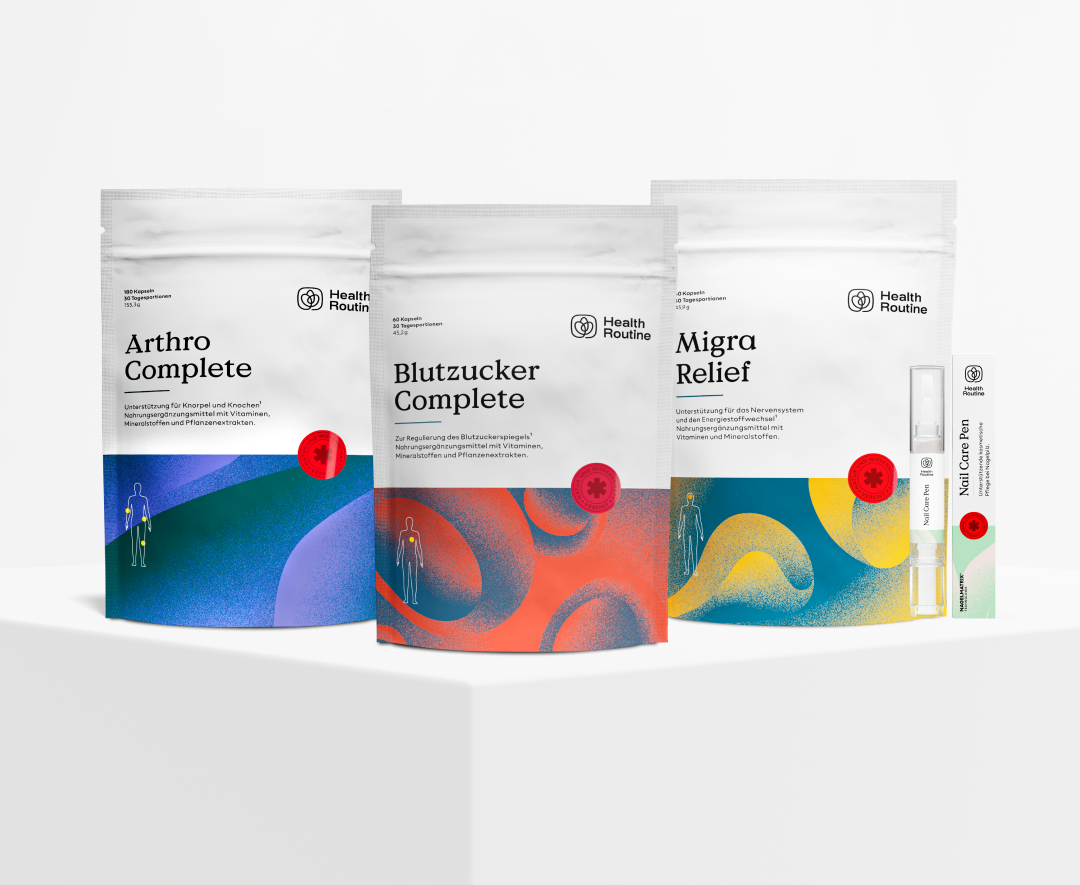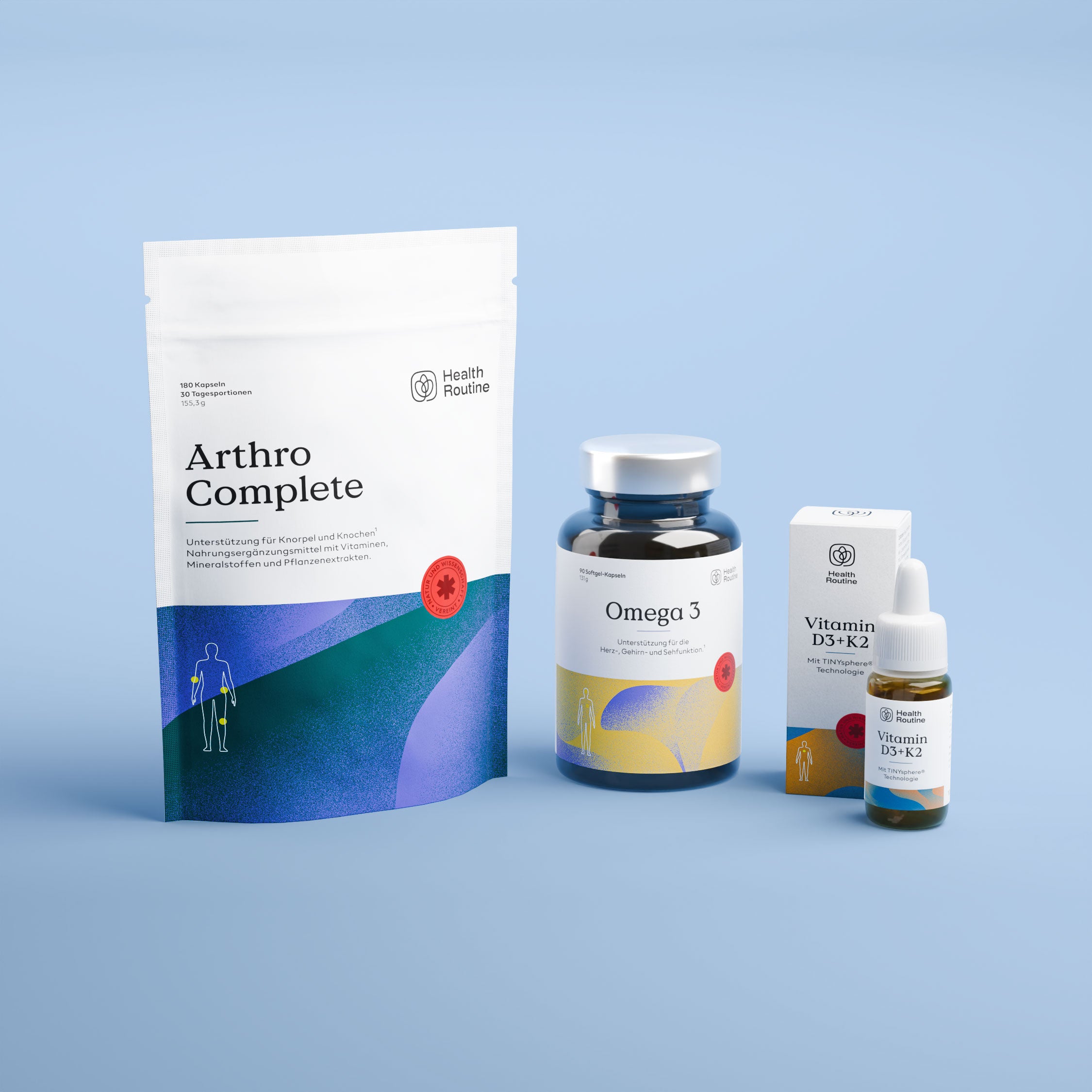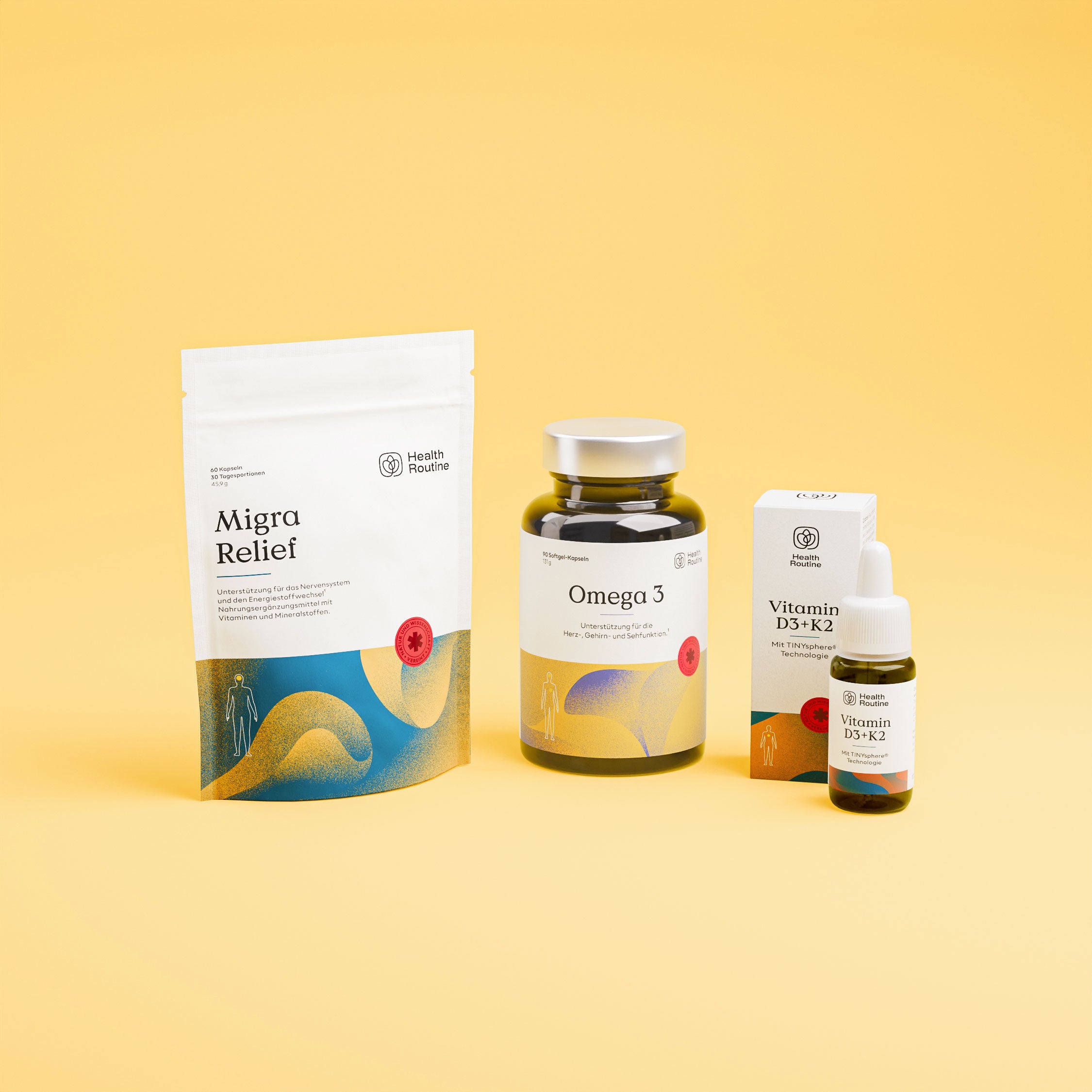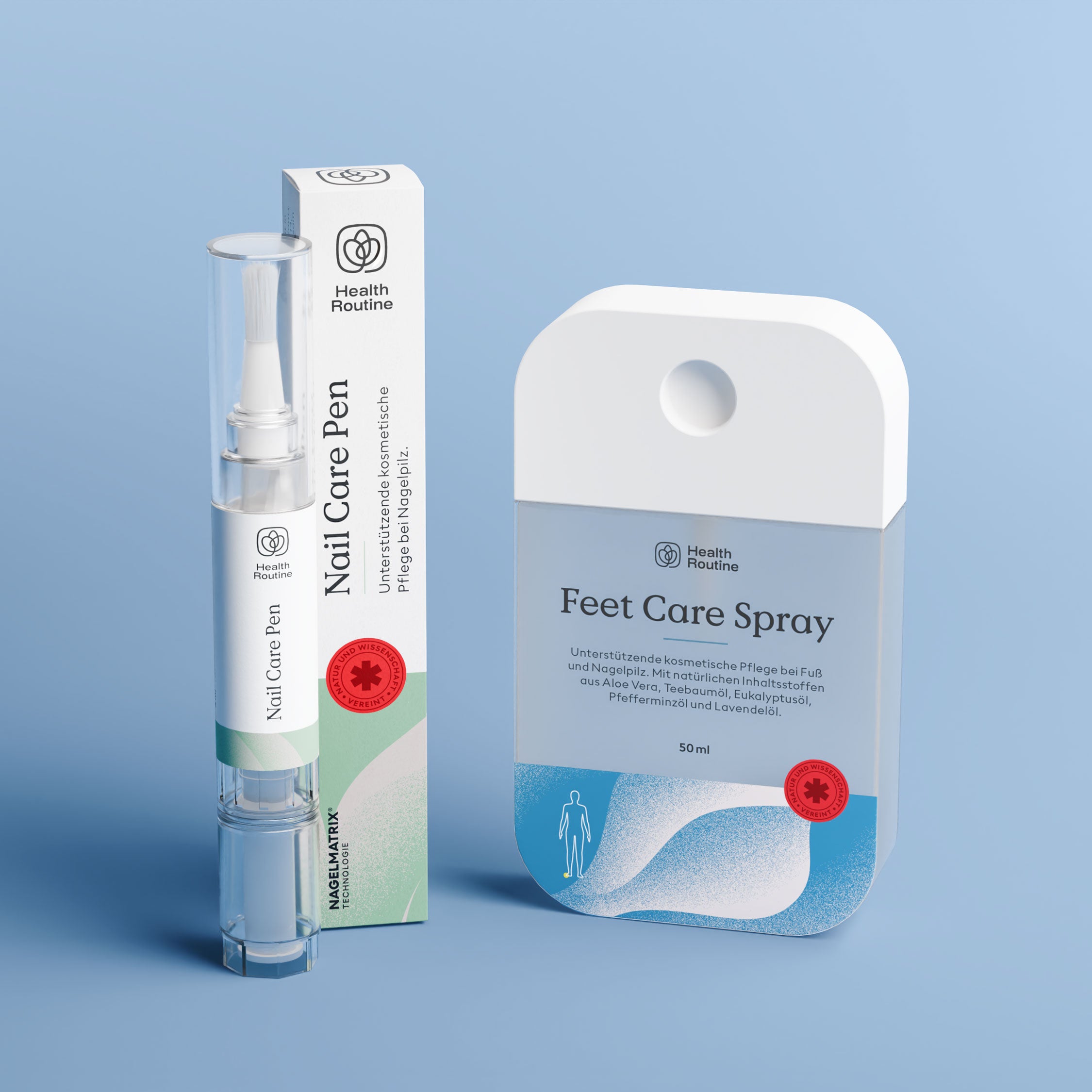The most important things at a glance:
-
Nail changes such as pitted nails, discoloration or rough nail plates can be signs of nail psoriasis.
-
In this guide you will learn more about possible symptoms and care measures.
-
You will receive practical everyday tips for caring for your nails – supportive, but without any promise of a cure.
Nail psoriasis: What is behind it?
Nail psoriasis is a form of psoriasis that specifically affects the nails. It can affect both fingernails and toenails . Often, small, visual abnormalities , such as discoloration or pitting , indicate nail psoriasis.
Think of your nails as sending you little SOS signals. It's important to recognize the signs early to ensure proper care and treatment and prevent the disease from progressing .

The most important causes in detail
Why exactly nail psoriasis occurs is a bit of a mystery that scientists are still working on, and the exact causes are not yet fully understood.
It appears that a combination of genetic factors and environmental triggers may play a role.
- A stressful day,
- a minor injury
- or even an infection could trigger psoriasis.
But it's not just about the "why," but also the "what now?" Therefore, it's crucial to understand the causes and take preventative measures against nail psoriasis.
Signs & Symptoms of Nail Psoriasis
Nail psoriasis often presents with subtle changes that can be easily overlooked, especially in the early stages. But if you look closely, your nails can reveal more than you might think.
Let's look at the most common signs and symptoms of nail psoriasis .
Are pitted nails an indication of nail psoriasis?
Pitted nails – small, dot-like depressions on the nail surface – are often an early sign of nail psoriasis. They look like tiny dents on the nail or dots and can be easily
- nail injuries,
- Deficiency symptoms
- or other skin diseases .
However, if you notice pitted nails on your fingers or toes, it is important to be alert and look for other additional signs of nail psoriasis.
These discolorations indicate psoriasis
Not all nail discoloration is the same. In cases of nail psoriasis, the nails may take on a yellowish-brown hue or even appear cloudy . These discolorations are often a clear sign that the nails need more care and attention .
Expert tip: It is always advisable to recognize such changes early and act accordingly.
Oil stains on the nails: A sign of nail disease
Oil stains on the nails aren't just a cosmetic problem. These yellowish, translucent spots , which often resemble an oil stain , are another sign of nail psoriasis.
They can spread across the entire nail or appear only in certain areas . If you notice these oil stains on your nails, it's important to consider proper care and treatment.
Crumbly nails: A symptom of nail psoriasis?
Crumbly nails can appear rough and brittle and are often associated with nail psoriasis. They can interfere with daily life and reduce self-confidence. But don't worry, there are things you can do about crumbly nails.
Treatment options for nail psoriasis: What really helps?
Nail psoriasis can not only be cosmetically disturbing, but in the worst cases, it can also cause pain and discomfort. Fortunately, there are several treatment options that can help relieve symptoms .
If you're looking for an effective treatment for nail psoriasis, it's important to find the right method for you. A distinction is made between external and internal therapies :
How does external therapy work for nail psoriasis?
Topical therapy is often the first step in treating nail psoriasis. It aims to relieve symptoms directly at the affected area.
Here are some common applications:
+ Corticosteroid creams: These anti-inflammatory creams help soothe the skin. However, they should only be used under the guidance of a dermatologist.
+ Calcineurin inhibitors: These medications reduce inflammation by inhibiting the activity of T cells in the immune system. They are an alternative when steroid creams are ineffective.
+ Tar-containing products: Tar can help reduce inflammation and slow the accelerated skin renewal process that occurs in psoriasis. It is a time-honored remedy for psoriasis.
+ Moisturizers: They help keep skin supple and prevent dryness, which can worsen symptoms.
Internal therapy for nail psoriasis: What are the options?
Sometimes external treatment isn't enough, and internal medication is necessary. Internal therapy aims to modulate the immune system and reduce the inflammatory response .
Here are some options:
+ Methotrexate: A drug that suppresses the immune system and reduces inflammation. It is often used in more severe cases of psoriasis.
+ Biologics: These medications target specific parts of the immune system to reduce inflammation. They are often used for moderate to severe psoriasis.
+ Retinoids: These vitamin A derivatives can help normalize skin renewal and reduce inflammation.
+ Light therapy: Although not an "internal" treatment, exposure to UV light can help reduce inflammation and relieve the symptoms of nail psoriasis.
5 proven tips for nail care for psoriasis
Proper care for nail psoriasis can make all the difference. With a few tried-and-true tips and products, you can help your nails stay healthy and strong .
Let’s dive into the world of nail care together.
1. Discover the care with our Nail Care Pen!
Our Nail Care Pen from Health Routine is your practical companion for healthy nails . Enriched with tea tree oil , a natural ingredient known to help with psoriasis, this pen offers gentle care and cosmetic support for discoloration.
🌿 Lemon juice, another ingredient, can improve the permeability of the nail, allowing valuable ingredients to penetrate deeper into the nail.
🌿 Vitamin E promotes nail growth and helps in the regeneration of damaged nail structure.
By combining these natural ingredients, the Nail Care Pen can help support the appearance of your nails.
Easy to use, it is ideal for daily care and promotes the natural balance of your nails.

Pflegt auch kosmetisch bei Nagelpilzinfektion
Spendet Feuchtigkeit & regeneriert
Schützt & stärkt die Nägel
2. The benefits of a salt bath for hands and feet
Treat your hands and feet to a revitalizing experience with our Health Routine Foot Bath Salts . Enriched with tea tree oil , this salt provides soothing care for psoriasis.
🌿 Sea salt is known for its cleansing and anti-inflammatory properties, which can help soothe skin. Baking soda has alkalizing properties that can help balance the skin's environment and stabilize its pH.
🌿 The essential oils , especially tea tree oil , are valued for their antimicrobial and soothing properties. When combined, these ingredients work together to refresh and revitalize your skin.
After a relaxing bath with our foot bath salts, your feet and hands will feel refreshed and cared for .

Schutz, Pflege & Hygiene bei Fuß- und Nagelpilz
Ideal für die tägliche Pflege der Füße
Bestehend aus natürlichen Wirkstoffen
3. Strengthen your nails
Strong nails are not only a sign of beauty, but also of health. Strengthening and protecting nails is especially important for people with nail psoriasis.
Regular filing , for example with the gentle Using a glass file from Health Routine , avoiding harsh nail polish removers , and applying nourishing oils can help keep your nails strong.
Our insider tip for well-groomed nails: The Nail Growth Serum from Health Routine . This serum, rich in natural ingredients like almond oil, jojoba oil, and biotin, not only promotes nail growth but also restores nails' natural shine.

Attraktive und gepflegte Nägel
Verleiht Nägeln wieder ihren natürlichen Glanz
Schützt & stärkt die Nägel
4. Maintain a balanced diet
Nutrition plays a key role in the health of your nails. A balanced diet rich in vitamins and minerals can help keep your nails strong and healthy.
- Biotin,
- zinc
- and iron are important for nail growth.
Expert tip: So, remember to include plenty of fresh fruits, vegetables and whole grains in your diet.
5. Nail biting: A harmful vice you should get rid of
Nail biting is a habit that is often difficult to break. However, nail biting can also affect the health of the nails . It can lead to infections and Increase the risk of worsening nail psoriasis.
If you are having trouble getting rid of this vice, perhaps you should try a bitter-tasting nail polish specifically against nail biting or distract yourself with something when the urge to chew arises.
Additional tips for relieving nail psoriasis
In addition to the tried and tested care tips, there are also other methods that can help relieve nail psoriasis.
Here are some additional tips:
-
Regular hand and foot baths: A gentle bath can help soothe the skin and reduce inflammation.
-
Use mild soaps: Harsh soaps can further irritate the skin. Therefore, always choose mild versions.
-
Wear breathable shoes and gloves: This prevents a moist environment that could worsen symptoms.
-
Avoid irritating substances: Chemicals or harsh cleaning agents can further stress the skin.
- Regularly moisturize hands and feet: This helps prevent dryness and cracking and keeps the skin supple.
Are there effective home remedies for psoriasis on nails?
Yes, there are some home remedies that can help relieve the symptoms of nail psoriasis. One popular home remedy is vinegar . A vinegar foot soak for nail psoriasis can help reduce inflammation and soothe the skin .
Expert advice: However, it is important to note that home remedies alone are often not enough and are best used in combination with medical treatments.
Nail psoriasis or nail fungus: All the differences at a glance
It's not always easy to distinguish between nail psoriasis and nail fungus , as both conditions can have similar symptoms. However, there are some differences that can help differentiate the nail problems.
Previously: If you want to know how to treat nail fungus , read this post.
Here is an overview that highlights the key differences between nail psoriasis and nail fungus:
feature |
Nail psoriasis |
nail fungus |
| Caused | Autoimmune reaction of the body | fungal infection |
| Appearance | Discoloration, thickening, pitted nails | Yellowish discoloration, brittle nails |
| Affected areas | Can affect both fingernails and toenails | Often only toenails |
| Accompanying symptoms | May be associated with other psoriasis symptoms | Often isolated without other symptoms |
| Odor | Typically no unpleasant smell | May cause an unpleasant odor |
| Treatment | Topical creams, light therapy, medications | Antifungal creams, medications |
If you are unsure, do not hesitate to consult a dermatologist to receive an accurate diagnosis and begin the right treatment.
Conclusion
Nail psoriasis isn't just a matter of nail appearance; it also reflects the internal processes of our body. But with the right knowledge, careful care, and the right products, you can strengthen and help your nails .
At Health Routine, we understand the importance of healthy nails and are here to help you achieve beautiful and healthy nails.
FAQ
Is nail psoriasis dangerous?
Nail psoriasis itself is not dangerous, but it can cause discomfort and cosmetic abnormalities. It is important to recognize symptoms early and begin appropriate treatment to avoid further complications.
Which vitamin is missing in psoriasis?
There are no specific vitamins directly linked to psoriasis. However, some studies have shown that people with psoriasis often have lower vitamin D levels.
Vitamin D can play a role in regulating the immune system and inflammatory responses. However, only your family doctor or dermatologist can determine whether vitamin D supplementation is appropriate for you.
Is nail psoriasis contagious?
No, nail psoriasis is not contagious. It's an autoimmune disease in which the immune system attacks skin cells. It can't be transmitted from one person to another through touch or any other means. However, it's always advisable to see a dermatologist if you have skin or nail problems.
Your medical advice
Our products are not intended to diagnose, treat, cure, or prevent any disease. The information provided in this article is for informational purposes only and is not intended as a substitute for advice from your physician or other healthcare professional.
Furthermore, our products are not a substitute for medications or other treatments prescribed by your doctor or healthcare provider. Regardless of the due care taken, no liability or warranty is assumed for the
- Accuracy,
- topicality,
- completeness
- and availability of the information provided.
No legal claims can be made for any damages potentially resulting from the use and application of this information. Liability claims of any kind are excluded.






